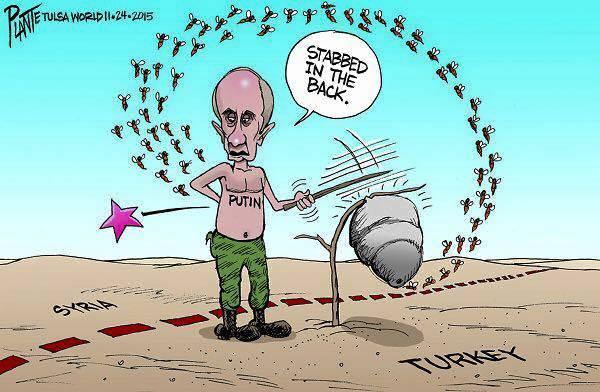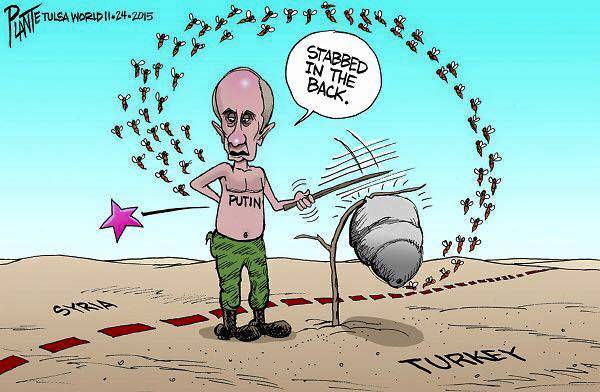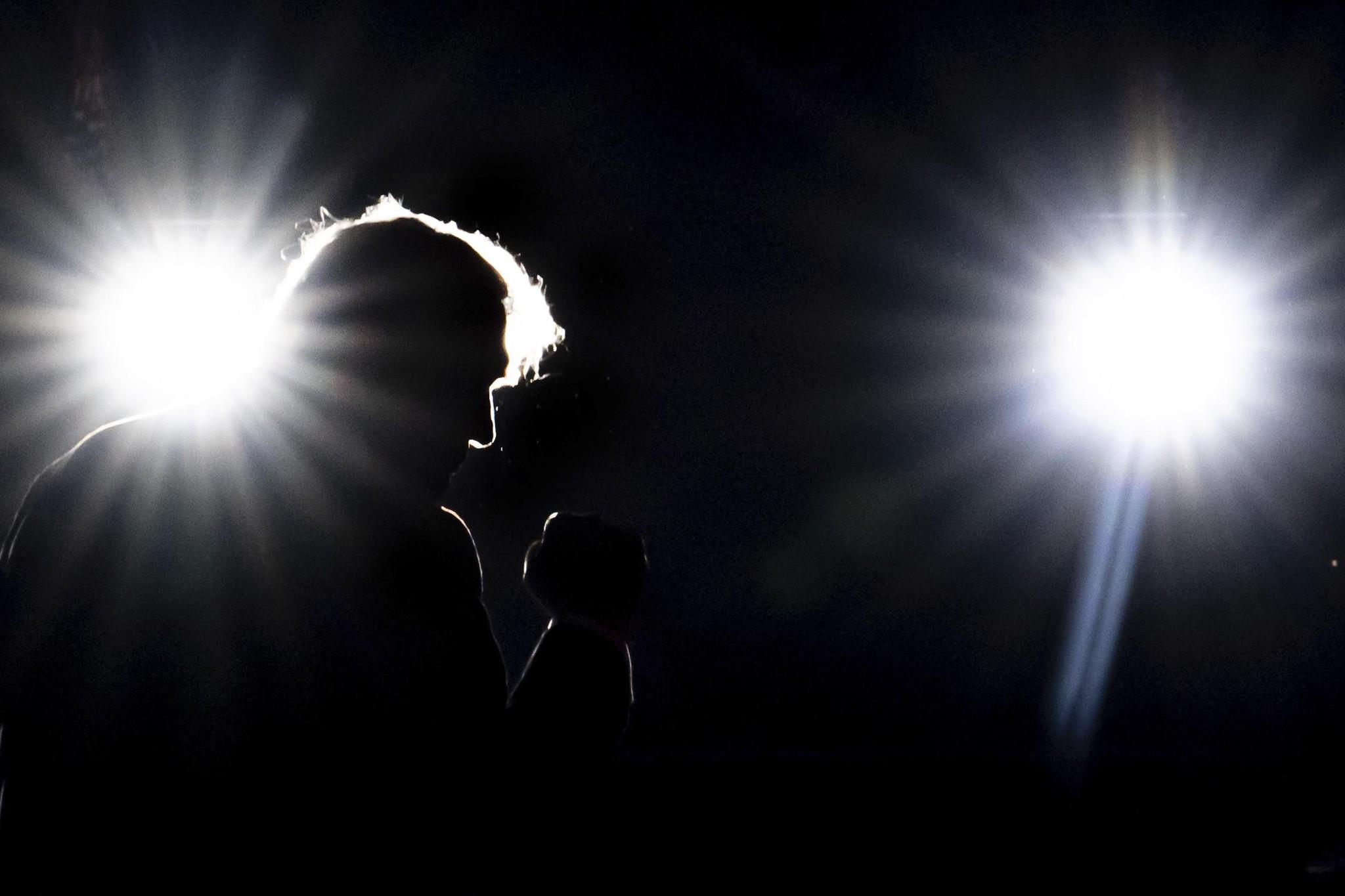
Syria 2015: how realism wins again in the XXI century

Turkey is blaming Russia for crossing over its own airspace, thus violating its sovereignity.
Ankara also stated that the Russian Sukhoi pilot was alerted over and over before getting shot (available here), but that these alerts fell on deaf ears. On the contrary, Russia denied this fact.
Was it a pilot’s mistake? Or an explicit Russian endeavor to test NATO/Turkish anti-aircraft capabilities? Or maybe the Russian target was really inside the Turkish borders? We will never know.
We just know that, after this incident, Russia reacted with classical diplomatic moves: the Turkish ambassador in Moscow was summoned, FM Lavrov trip to Ankara was canceled, military cooperation between the two countries was suspended and the Parliament submitted a formal request to call off direct flight from and towards Turkey. We have to keep in mind that all these steps are temporary.
Just a while after Russia undertook these steps, Putin explicitly talked about “a backstab from a friendly country, now being an accomplice of terrorism” (an accusation he already made during the G20 in Antalya). Putin also threatened to undertake “serious measures” that could put the Russian-Turkish relationship in jeopardy.
Meanwhile Russia, in order to deter Turkey, deployed scores of S400 air-defence systems to Khmeimim, close to Latakia, Russia’s facilities in Syria; assigning another jet to escort any Sukhoi bomber on duty.
Ankara immediately expressed its own version of the events as well: PM Davutoglu would have personally given the order to shoot down the SU-24, following the repeated border violation. Then, just a few hours after the incident, Erdogan and Davutoglu immediately called up an extraordinary council of the Atlantic Alliance (NATO, of which Turkey is member). An extraordinary council that reaffirmed Turkey’s right to defend its own airspace, at the same time trying to descalate the situation.
Notwithstanding the sharp tones, tension seems going to decline in the coming weeks.
In both countries’ best interests, considering the high-level of economical-commercial exchange (and the Turkish control of Bosphorus strait, where Russian ships go through in their way to Syria…) and in spite the different outlook upon Assad’s future and other matters (i.e. the targeted killing of Chechnyan exiles in Turkey carried out by Russia…).
To really grasp the significance of the rifts between Turkey and Russia (apart from the incident) it would be helpful to frame it within the big picture of the Syrian civil war, which has been going on for 5 years by now.
A big picture where *every* protagonist of the Syrian war pursues its own dirty games.
First, best to do not let ourselves get carried away too much by Putin’s intervention, framing him as the true game-changer: it is time to think again about it.
Despite how, after the carnage in Paris, Moscow seems to have turned into a NATO partner (military coordination with France), Russia stepped in Syria in order to defend its own interests. Namely, to prop up Assad’s regime.
Actually Putin aims at moving the military front as far away as possible from Alawi-majority areas, where Moscow’s facilities in Tartus and Latakia are placed. To eventually take part in negotiations with some “good” cards to play, willing to sacrifice even Assad in exchange for recognition of Russia’s stake in Syria.
In doing so, Moscow carries on bombing rebels-held areas and covering from air the loyalists counteroffensives. If, for instance, we take a brief look at the map of the airstrikes, it is remarkable that the Russian bombings are more focused on the Hama/Idlib (FSA-held ) and the Turkish border areas than on the ISIS strongholds.
To move on, Turkey pursues its interests in these borders areas.
Here Ankara sponsors Turkmen rebels, supplying them with TOW rockets, and simultaneously turns a blind eye on foreign-fighters flows.
Ankara also retains a grey zone, where its main aim is to create a safe area in order to pursue its own interests and magnify its own influence: to balance the threat posed by YPG and actively support anti-Assad rebels.
Turkey is also embroiled in buying and smuggling Daesh/ISIS cheap oil, thorugh local brokers (the same oil is bought for a chep price by the loyalist forces too).
For the Sultan Erdogan both the Kurds and Assad, not ISIS are two sides of the same coin, thwarting the Turkish plans of greatness.
In this two-players game, we need to look at the others protagonists entangled in the conflict.
The United States.
Reluctant to send military force on the ground, they are fully aware that a low-profile stance on the Syrian issue is the best approach.
After all, Daesh/ISIS poses no tangible threat to US interests (containment is the key word of Obama’s policy), and the deposition of Assad remains the real political goal that the US want to achieve.
Obama, in the press conference held with French President Hollande just a few days ago, reaffirmed that Turkey has the right to defend its own airspace and that any actions Russia carries out in Syria should be better coordinated with those of the Coalition.
Given that Russian airstrikes have, at least in theory, opposite targets : Moscow is heavily bombing CIA-trained rebels, whilst the US-led coalition pounds more Raqqa and Deir-Ezzor, focusing on ISIS oil facilities.
The same US, at the G20, asked Turkey to do its own best to stop the foreign-fighters flow through its border. But for Obama the airbase of Incirlik, south of Turkey, is the main asset US has for operations in Syria and Iraq, that’s why, for many pundits, Washington is going to close a blind eye over Erdogan’s dirty games.
There are also Iran and the Gulf countries.
In the dormant conflict between Sunni and Shia’a, both of them move their proxies to fight each other and use Syria (as well as Yemen and Iraq, like Lebanon in the 80’s) as a battlefield for their geopolitical stakes.
Gulf monarchies feel abandoned by the US, and they exploit (and fund along with private donors and zealot ulemas) Daesh/ISIS as a display of Sunni discontent to counter the rise of Shia’a axis (Hezbollah, Iran, Syria). A rise that, in the eyes of the Saudi, has been legitimated by the Iranian Nuclear Agreement, that would give political recognition to the Ayatollahs regime.
The Sunni Discontent reached its peak in the aftermath of 2003-US led invasion of Iraq, when the dictatorship of (the Sunni) Saddam was replaced with Shia power (who were kept out of it until then). Ever since, Iran calls the shots in Iraq. Tehran had then an easy time in using the Iraqi presidents for its advantage to play into its hands (Nuri al Maliki above all), stretching its strategic depth in the cradle of the Babylonian civilization.
Concurrently this has by far exacerbated sectarian strifes, that in turn were cleverly exploited, in anti-Iran terms, by the Saudi and their allies.
Although some attempts in order to promote national recomposition were made (the famous surge of David Petraeus), Iraq today is a failed-state: Sunni turn more and more to Daesh/ISIS as a political force, whereas Iranian Shia militias thrive across the country.
In Syria struggle Saudi-Iran is on the same wavelenght with Iraqi one.
Iran backs Assad, a bridgehead for the Hezbollah supply route, that, in the end, is the real bargaining chip of Teheran towards the West (role of H. as unconventional threat to Israel, war 2006).
Gulf countries openly support Sunni rebels, and, covertly, Daesh. In a typical zero-sum-game.
As long as a political agreement establishing respective areas of influence will not be stricken between the two major islamic powers – or, in the worst case-scenario, an all-out clash resulting in a war with a clear winner (we’re talking about two countries that possess continental ballistic missiles and cutting-edge military warheads..) – there will be no solution for the Syrian conflict or the other regional conflicts.
Assad plays into all this mess. His ambiguous character is the real issue at stake . Most of the players involved, or almost the majority, want the head of Bashar. For Iran and Hezbollah, with Russia in the background (Russia seems to soften his stance on this), that is taboo.
Just a brief look from scratch to the Syria’s revolt. The revolt was localized at first, but the crackdown by the regime favoured its spread.
Regime crushed brutally on revolt. Assad’s indiscriminate bombing, alongside the abuse of non-conventional weapons like barrel bombs (barrel-shaped metal containers filled with explosives) that are dropped from helicopters on highly-populated areas and blown up a little above the ground (here is Ghouta, east of Damascus), really drained a good share of consensus by a part of the Sunni community towards Assad’s regime.
After all, in the “Presidential Monarchy” of Assad (Jumlukia in arabic ), ruled by an Alawite minority (a Shia offshoot), the cooptation of the Sunni occurred on the basis of a do ut des policy (allocation of grants and resources, political favours, representation in exchange for endorsement, etc.).
At least until the iron fist of the regime against the revolt, that leads many Sunnis to distance themselves from Assad: the Iranian intervention, and then the one by Hezbollah just fueled the sectarian rifts, bringing back, as it was felt by the majority of the people, a scenario of a Shia aggression to the detriment of the Sunni population.
Today Assad is the one who carries on saying “Either me or terrorists”.
But if we look back to 2003, when the US-led invasion of Iraq took place, Assad set free many jihadists from the Sednaya prison to enable them to cross the border and go fight the jihad against the US and their allies. As well as, from 2011 on, the regime granted an amnesty to a string of incumbent commanders of the major jihadist formations in Syria today (Zahran Alloush, head of Jaish al Islam, and Mohammed Haydar Zammar, an ISIS commander but a former recruiter for the 9/11 attackers…).
Assad did all of this in order to cleverly eclipse secular and democratic protests, in order to present himself as the only viable alternative against the spread of terrorism of the “formerly democratic revolt”.
Holding onto power at the same time and, remarkably, killing 9-folds more than ISIS.
Kurds embody the only hope in the turmoil. But they are hope just for a part of Syria, the freed Rojava one.
And they pose two orders of problems: an ethnic and a military one. That is, Arabs and Kurds barely get along well on the ground – on the contrary, many Arabs blame Kurds of anti-Arab bias. And lots of Kurds in turn consider Arabs as a fifth column for Daesh infiltration.
In addition, some military hurdles exist. Kurds are split up within themselves, among PKK-friendly organizations, like the Syrian YPG, and Iraqi Kurds, broadly-known as peshmerga, which are closer to the US agenda and far from the YPG socialism.
What makes things worse is the ongoing struggle between PKK and the Davutoglu government.
Given this situation, thanks to the US-led Coalition airstrikes, YPG is just 25-km-out of Raqqa, the city which is regarded as the Caliphate capitol…
A last consideration, as a conclusion.
It would be better to start considering things for how they are, thus having a certain dose of realism.
That means to look at reality the way it is, not the way it should be.
That is to say, a real cooperation among states – in Syria as well as in the global war on terror (label it as you prefer) – is impossibile.
Why every state aims at pursuing its own national interest, that seldom matches with the collective one. And, in doing this, every state pays a great deal of attention to the balance of power. Consequently they are wary of any move perpetrated by other parties and take steps in order to maximize their own position within the international system. What follows, under such circumstances?
That Turkey carries on its anti-Kurds and anti-Assad realpolitik of undercover support to Syrian rebels and ISIS near the border, mindful of its important role at this juncture for the US and Europe (let’s also consider the management of the refugee flows).
That Putin keeps on defending Russian stakes in Syria, framing it as a crusade against terrorism. At least until he gets bogged down in a quagmire war, alike the one in Iraq, 2003.
That the US keep staying aside, alongside their airstrikes and drone policy. Leaving Europe and NATO to handle the situation on their own.
That Iran and the Gulf powers clash more and more harshly in Syria and in other regional battlefields, each of them by shoring up their own proxies.
That Assad continues his rethoric of picturing himself as a bulwark against terrorism, now bombing moderate rebels but preserving ISIS as a card to be eventually played at a later time.
That Israel looks at the situation as a concerned player, while the ISIS strengthens itself, by exploiting splits and contradictions of its counterparts. And, in the meantime, it pursues a strategy of global asymmetrical warfare, with its own burgeoining brand across the five continents.
This equilibrium is not going to change in the near future, as long as its upkeep by the players remains low. And some limited costs, like a jet being shot down, are allowable to some extent – when compared to the possibility of conflict on a larger scale.
Ti è piaciuto questo articolo? Infoaut è un network indipendente che si basa sul lavoro volontario e militante di molte persone. Puoi darci una mano diffondendo i nostri articoli, approfondimenti e reportage ad un pubblico il più vasto possibile e supportarci iscrivendoti al nostro canale telegram, o seguendo le nostre pagine social di facebook, instagram e youtube.




















